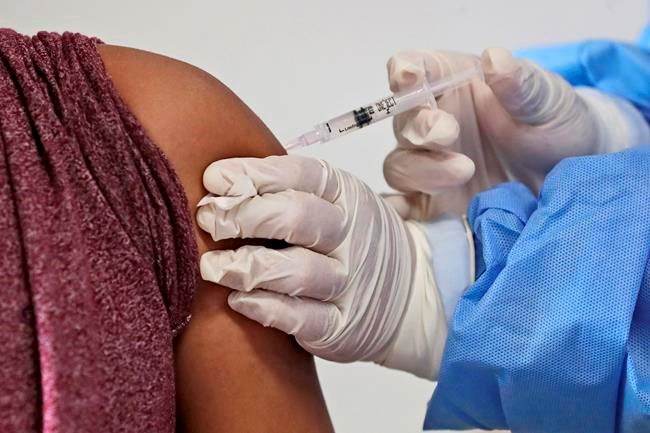Biotechnology company Novavax Inc. says it has submitted its COVID-19 vaccine for approval in Canada, opening the prospect of another product on the country's vaccine market that could win over a few more vaccine-hesitant residents.
The U.S. company said Friday it has completed submission of all modules required by Health Canada for evaluation of its protein-based COVID-19 vaccine — the first of its kind up for consideration in Canada.
The regulatory filings include clinical data from a trial of 30,000 participants in the U.S. and Mexico, which found 100 per cent protection against moderate and severe disease and 90.4 per cent efficacy overall, Novavax said.
Innovation, Science and Industry Minister François-Philippe Champagne wrote on Twitter Monday that the news was welcome as Canada works to strengthen pandemic preparedness.
In a statement Monday, however, Health Canada said it is still waiting for the final package of manufacturing data from the company.
Infectious disease experts say the would-be arrival of another vaccine — particularly a non-mRNA one — could have several benefits.
More than 88 per cent of the population aged 12 and older has now received at least one COVID-19 dose, according to the Public Health Agency of Canada. But in pockets of the country, resistance remains.
"One of the many reasons driving that is a hesitation toward mRNA vaccines. And if we do approve of Novavax and roll this out, that may be a small piece of a much larger puzzle to facilitate uptake of COVID-19 vaccination in Canada," said Dr. Isaac Bogoch, an infectious disease specialist and researcher based at Toronto General Hospital.
Approval of the Novavax vaccine could also help boost inoculation in young kids, he said in an interview.
"We know that some parents are hesitant about mRNA vaccines in children now," Bogoch said, though he added that shots for kids may be "far away" due to a dearth of clinical studies.
Construction on a vaccine-manufacturing plant in Montreal with annual capacity of about 24 million vaccine doses wrapped up in June, but mass production may not be right around the corner.
Champagne's office said four months ago the facility would not have assembly lines moving until 2022.
"They've had definite production problems at their plants in the U.S. But what they claimed is that they can really generate large amounts of vaccine that is much easier to distribute because it doesn't have the cold chain challenges of the Pfizer and Moderna vaccines," said Dr. Andrew Morris, a professor in the department of medicine at the University of Toronto who studies infectious diseases.
He said the vaccine candidate could be a boon to developing countries that have struggled with storing mRNA vaccines at cold temperatures in far-flung locations.
Novavax also recently announced regulatory filings for its vaccine in the United Kingdom and Australia and said it plans to submit the complete package to the U.S. Food and Drug Administration by the end of the year.
Health Canada has been reviewing Novavax's data since Jan. 29, as part of its rolling submission for approval.
The regulatory agency said Monday all COVID-19 vaccine and drug submissions are prioritized and reviewed on an expeditated timeline, without compromising safety, efficacy and quality standards.
It's not clear how long it will take to evaluate Novavax's submission.
Novavax and the National Research Council (NRC) continue to work toward production of a COVID-19 vaccine in Canada, according to a statement from the industry minister's press secretary, John Power.
"When this pandemic began, Canada had very limited biomanufacturing capacity suitable for a COVID-19 vaccine," Power said in a statement.
"We established the NRC’s Biologics Manufacturing Centre to ensure that Canada would have a large-scale and flexible public vaccine production facility to ensure future pandemic preparedness and support the Canadian life sciences sector."
This report by The Canadian Press was first published Nov. 1, 2021.
— With files from Laura Osman in Ottawa and Allison Jones in Toronto
Christopher Reynolds, The Canadian Press



